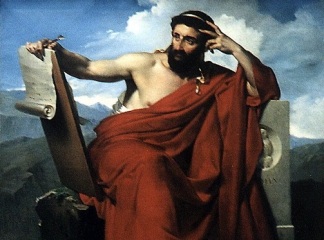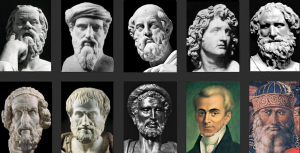
Statesman, Lawgiver, Philosopher, Poet (c638 BC – c558 BC)
Solon was born in Athens from a wealthy family descending from the last legendary king of Athens Codrus. From an early age, Solon was a philomath but the unfortunate loss of his father’s fortune made him a merchant, travelling in Egypt and Cyprus and trading Athenian products. Throughout his travels, Solon became acquainted with the way of administration of various cities he visited. With his perspicacity and philopatry, Solon was motivated to become involved in Athenian politics and save Athens from the forecoming downfall which he was sensing.
When Solon gained full power as a legislator, wealth and power was in the hands of few while the majority of the Athenians were plunged into poverty, some of them forced to become slaves to repay their debts. For this reason, Solon introduced the law of Seisachtheia, a word that means “shaking off the burden”. This law cancelled pre-existing debts, ended debt-related imprisonment and slavery, which had become rampant in Athens and returned confiscated property to their respective owners. Other laws he introduced decreased the number of lands owners were allowed to have and forbade cereal and grain export except olive oil because so much had been exported that there was not enough for the Athenians. He promoted trade and minted a new coin, which proved to be more effective in trade with other cities.
As far as concerning his political reforms, Solon laid the foundations of Athenian democracy. Through a series of laws, he gave political privilege to the people, regardless of their wealth and obliged them to participate in the administration of their city. He divided the people into 4 classes depending on their wealth and on this basis he put taxation on the basis of their income. He founded the Council of the Four Hundred, something similar to the modern day parliament, the Assembly, the sovereign body of the state in which any citizen could participate and Heliaia, the supreme court. Other important political actions of Solon were the reclaiming of Salamis in 604 BC by the Athenians, which they had lost during a war with the Maegarians, reforms in the army, introduction of strict codes of Law against homosexuality and the abolition of most of Draco’s laws, including the death penalty.
Interestingly, Solon and Plato share the same descent, henceforth being distant relatives. He has a prominent role in Plato’s magnum opus Timaeus, where Critias narrates to Socrates and the others about Solon’s visit to Egypt. There, he has a conversation with a wise priest. This conversation provides us with a huge insight on Greece’s lost history many millennia ago. The priest says “O Solon, Solon, you Hellenes are never anything but children, and there is not an old man among you”. Solon in return asked him what he meant. He replied, that “in mind you are all young; there is no old opinion handed down among you by ancient tradition, nor any science which is hoary with age. And I will tell you why. There have been, and will be again, many destructions of mankind arising out of many causes; the greatest have been brought about by the agencies of fire and water, and other lesser ones by innumerable other causes. There is a story, which even you have preserved, that once upon a time Phaethon, the son of Helios, having yoked the steeds in his father’s chariot, because he was not able to drive them in the path of his father, burnt up all that was upon the earth, and was himself destroyed by a thunderbolt. Now this has the form of a myth, but really signifies a declination of the bodies moving in the heavens around the earth, and a great conflagration of things upon the earth, which recurs after long intervals; at such times those who live upon the mountains and in dry and lofty places are more liable to destruction than those who dwell by rivers or on the seashore […]. When, on the other hand, the gods purge the earth with a deluge of water, the survivors in your country are herdsmen and shepherds who dwell on the mountains, but those who, like you, live in cities are carried by the rivers into the sea. Whereas in this land, neither then nor at any other time, does the water come down from above on the fields, having always a tendency to come up from below; for which reason the traditions preserved here are the most ancient”. […]
“Whereas just when you and other nations are beginning to be provided with letters and the other requisites of civilized life, after the usual interval, the stream from heaven, like a pestilence, comes pouring down, and leaves only those of you who are destitute of letters and education; and so you have to begin all over again like children, and know nothing of what happened in ancient times, either among us or among yourselves. As for those genealogies of yours which you just now recounted to us, Solon, they are no better than the tales of children. In the first place you remember a single deluge only, but there were many previous ones; in the next place, you do not know that there formerly dwelt in your land the fairest and noblest race of men which ever lived, and that you and your whole city are descended from a small seed or remnant of them which survived. And this was unknown to you, because, for many generations, the survivors of that destruction died, leaving no written word”. The dialogue serves as a prooemium to the priests’ narration of Atlantis, which is the core subject of Plato’s Timaeus.
Today, Solon is acknowledged as one of the founding fathers of Athenian democracy. His reputation at the time of the peak of his career grew immensely. As a result, he was considered as one of the 7 wise men of Greece. He died in old age witnessing his homeland’s prosperity thanks to his legislative reforms.
Bibliography
- Ayfantis, Georgios. Anthropos & Epistimi – Enimerosis: Prehistory and History of Man, Science & Civilization. Athens: Hellenikon Selas, 2009. Print.
- Plato. Timaeus – Kritias. Athens: Georgiades, 2011. Print.
- ”Solon”. Helios. Passas, I. Athens. 1946. Print.

[…] Sappho – Great… on Solon […]
LikeLike
[…] poems were read by some of the most prestigious men of Greece’s ancient history. It is said that Solon was so fascinated by her writings that he attempted to learn some of them by heart. Others are […]
LikeLike
[…] when someone sleeps for extremely long time. In another myth, Epimenides is said to have advised Solon on the lawmaking of Athens. He was considered as the seventh of the Seven Sages of ancient Greece […]
LikeLike
[…] punished with death. His most well-known was the law of homicide, which was the only one kept by Solon when he succeeded Draco as lawgiver of Athens. Among some of Draco’s laws were the implementation […]
LikeLike